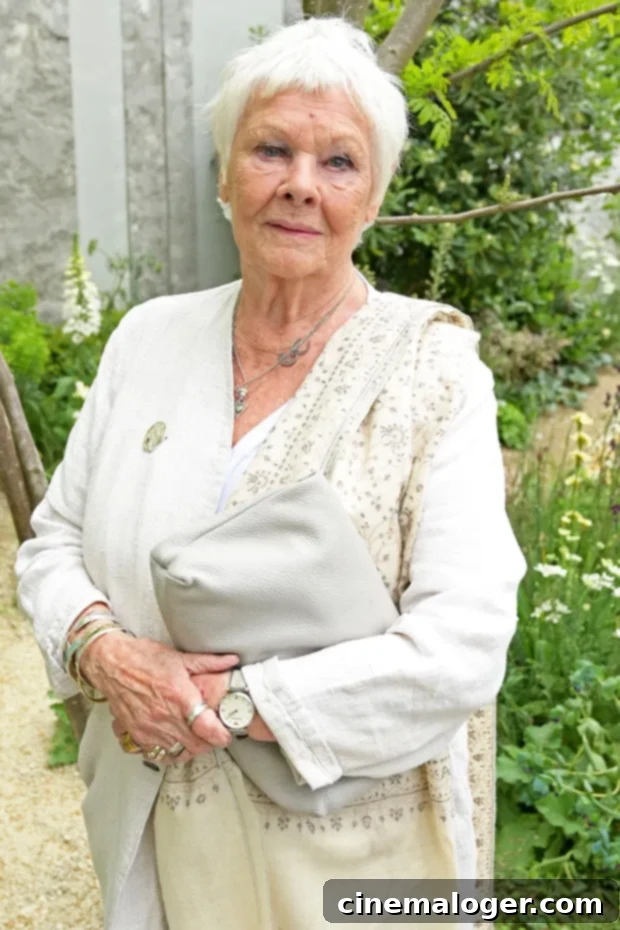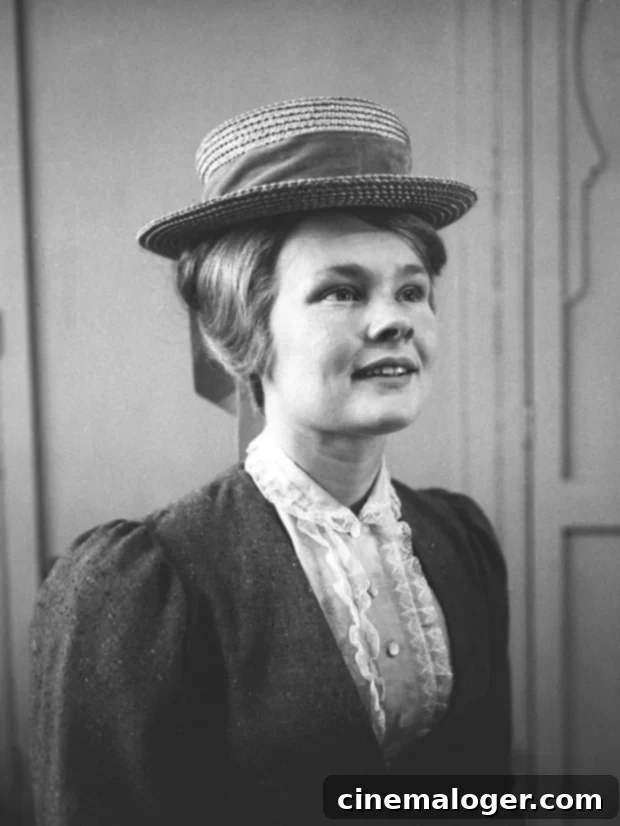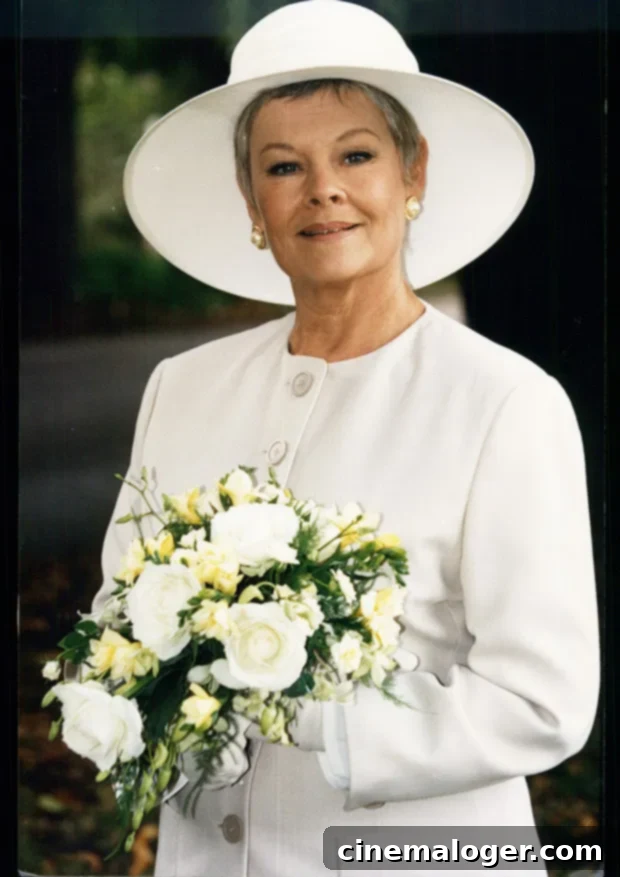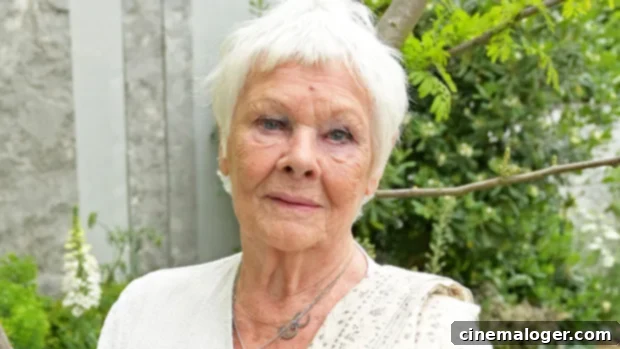Dame Judi Dench’s Inspiring Battle with Macular Degeneration: A Decade of Resilience and Unwavering Dedication to Acting
Dame Judi Dench, a titan of stage and screen, has captivated audiences for over seven decades with her unparalleled talent and commanding presence. Known for her diverse roles, from Shakespearean heroines to the iconic M in the James Bond series, Dench has consistently pushed boundaries and defied expectations throughout her illustrious career. Beyond her acting prowess, she has also been a vocal advocate for older actresses, championing their continued presence and relevance in the industry.
For over a decade, however, this Academy Award-winning actress has faced a profound personal challenge: age-related macular degeneration (AMD). Diagnosed in 2012, this progressive eye condition has gradually diminished her central vision, impacting her ability to read scripts, recognize faces, and navigate her daily life with the ease she once knew. Despite the significant hurdles, Dame Judi has met this adversity with characteristic courage and an unyielding commitment to her craft, demonstrating a remarkable resilience that continues to inspire fans and peers alike.
- Dame Judi Dench has openly discussed her ongoing struggle with age-related macular degeneration (AMD), a condition that profoundly affects her eyesight.
- She received her diagnosis of AMD in 2012, embarking on a journey of adaptation and perseverance.
- Recently, she candidly shared that her vision has deteriorated to the point where she can no longer clearly see on film sets, necessitating new methods of working.
Understanding Age-Related Macular Degeneration (AMD): A Closer Look at the Condition
Age-related macular degeneration (AMD) is a common eye condition and a leading cause of vision loss among people 50 years and older. It primarily affects the macula, a small but crucial part of the retina located at the back of the eye. The macula is responsible for sharp, central vision, which is essential for tasks like reading, driving, and recognizing faces. Damage to the macula can lead to blurred central vision, distorted images, and even blind spots, significantly impacting a person’s quality of life.
As Dame Judi herself revealed, there are two primary types of AMD: dry and wet.
Dry Age-Related Macular Degeneration (Dry AMD)
Dry AMD is the more common form, accounting for about 85-90% of all AMD cases. It occurs when light-sensitive cells in the macula slowly break down. This process is often associated with the formation of small, yellow deposits called drusen under the macula. Initially, dry AMD may cause no noticeable symptoms, or only mild blurred vision. However, as it progresses, central vision can become increasingly impaired, making it difficult to perform detailed tasks. Unfortunately, there is currently no cure for dry AMD, but early diagnosis and lifestyle changes, such as nutritional supplements, can sometimes slow its progression and help maximize remaining vision.
Wet Age-Related Macular Degeneration (Wet AMD)
Wet AMD is less common but typically more severe. It occurs when abnormal blood vessels grow under the macula, leaking fluid and blood. This leakage can rapidly damage the macula, leading to more sudden and significant vision loss. Symptoms often include visual distortions, such as straight lines appearing wavy, and rapid onset of blurred central vision. Unlike dry AMD, there are treatments available for wet AMD, primarily anti-VEGF injections. These medications can help to slow or stop the growth of abnormal blood vessels and reduce leakage, often preserving or even improving vision if administered promptly.
Dame Judi’s unique experience with having wet AMD in one eye and dry AMD in the other highlights the complex nature of the condition and the diverse challenges it presents.

The Diagnosis and Initial Impact: A Candid Revelation in 2012
It was in a candid 2012 interview with the DailyMail that Dame Judi Dench first publicly shared her diagnosis of age-related macular degeneration. She revealed a personal connection to the condition, noting that her mother had also battled AMD. Her situation was particularly complex, as she was diagnosed with both types: “I had wet in one eye and dry in the other and they had to do these injections and I think it’s arrested it. I hope so,” she explained at the time, indicating the serious nature of her vision issues and the proactive steps she was taking for treatment.
The immediate and most distressing impact of the condition on her professional life quickly became apparent. Dench confided that her deteriorating eyesight made it increasingly difficult to read film scripts. This vital aspect of her work, once a straightforward process, now required assistance. “I can’t read scripts anymore because of the trouble with my eyes. And so somebody comes in and reads them to me, like telling me a story,” she revealed, painting a picture of a revered actress adapting her fundamental working methods. This adaptation saw her relying on the kindness and support of close friends, her daughter Finty, or her agent to relay her lines and scene descriptions.
Beyond the professional sphere, the condition also began to affect her social interactions. “The most distressing thing is in a restaurant in the evening I can’t see the person I’m having dinner with,” she shared. This poignant detail underscored the broader implications of AMD, extending its reach beyond the bright lights of a film set into the intimacy of personal connection.
Despite these early challenges, the A Room With A View star remained resolute. Even then, she harbored no intentions of retiring, asserting her determination to continue her acting career. She acknowledged her limitations but also her strengths, confirming that she could still see, especially with the aid of bright lights and corrective glasses. This early declaration set the tone for the decade-long battle that would follow – a battle marked by challenges, adaptations, and an unyielding commitment to her art.

A Decade of Adaptation: Working Through Progressive Vision Loss
Since her diagnosis in 2012, Dame Judi Dench has been remarkably transparent about her journey with AMD. With no treatment available for her dry AMD, and ongoing management for the wet form, she has continuously adapted her methods to sustain her prolific career. Her candor has not only shed light on the realities of living with vision loss but has also offered an inspiring testament to human ingenuity and perseverance.
Learning lines, a fundamental skill for any actor, transformed into an entirely new process for Dench. In a 2021 interview with The Guardian, she elaborated on her innovative approach: “I’ve had to find another way of learning lines and things, which is having great friends of mine repeat them to me over and over and over again. So I have to learn through repetition, and I just hope that people won’t notice too much if all the lines are completely hopeless!” This charmingly self-deprecating comment belies the immense effort and vulnerability required to master scripts through auditory learning, relying heavily on her exceptional memory and the unwavering support of her inner circle.
The challenges extend far beyond script memorization. On film sets, where visual cues and the recognition of colleagues are paramount, Dame Judi has had to develop coping mechanisms. She has shared that she must get “very close to people to recognize who they are” and has occasionally walked past individuals she has known for years without realizing it. This candid admission speaks to the profound social and professional adjustments she endures daily. Furthermore, she recently revealed that her eyesight has deteriorated to the extent that she “can no longer really see when she’s on set for a movie.” This stark reality means she relies extensively on the guidance and assistance of those around her, including directors, crew members, and fellow actors, to navigate her environment and hit her marks.
Despite these significant visual impairments, Dame Judi’s spirit remains indomitable. Her commitment to acting, a lifelong passion, has never wavered. She views her condition not as a barrier to retirement, but as a challenge to overcome. This mindset is a powerful message of resilience, particularly for individuals facing similar age-related health issues. Her continued work, including her role in the 2022 Apple TV+ movie Spirited, serves as a testament to her enduring dedication and her refusal to be defined by her limitations.

Judi Dench Today: An Unyielding Spirit in the Face of Adversity
As of recent interviews, Dame Judi Dench continues to live with the daily realities of worsening vision due to AMD. Yet, her determination to continue her acting career burns as brightly as ever. In an interview with The Mirror on July 30, 2023, she elaborated on her current state: “I can’t see much. But you know you just deal with it. Get on. It’s difficult for me if I have any length of a part. I haven’t yet found a way. Because I have so many friends who will teach me the script. But I have a photographic memory.” Her acknowledgment of her “photographic memory” hints at an intrinsic advantage that has undoubtedly aided her in adapting to script learning without being able to physically read them.
Despite her unwavering resolve, Dame Judi has not shied away from expressing the emotional toll of her condition. She candidly described the shift in her independence as a “shock to the system” and admitted it was “ghastly” to increasingly rely on others. “It’s terrible to be so dependent on people,” she stated, highlighting the personal struggle associated with losing autonomy over everyday tasks. This vulnerability, however, is invariably followed by a declaration of her fierce spirit and dedication to her work.
Her public statements consistently reiterate her vow to keep working “as much as I can” and her resolute refusal to retire. This commitment to her profession, even in the face of such significant personal challenges, makes Dame Judi Dench an inspiring figure globally. Her journey with AMD is not just a personal health battle; it’s a powerful narrative about perseverance, the human capacity for adaptation, and the enduring power of passion for one’s life’s work. Her resilience serves as a beacon of hope and a reminder that age and physical limitations do not necessarily diminish one’s ability to contribute meaningfully and passionately to the world.
